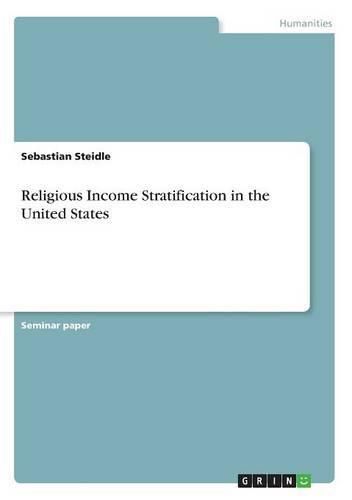Readings Newsletter
Become a Readings Member to make your shopping experience even easier.
Sign in or sign up for free!
You’re not far away from qualifying for FREE standard shipping within Australia
You’ve qualified for FREE standard shipping within Australia
The cart is loading…






Seminar paper from the year 2015 in the subject Sociology - Religion, grade: 1,7, University of Tubingen (Institut fur Soziologie), course: Social Stratification, language: English, abstract: Scholars have been investigating the relationship between religion and socioeconomic status ever since Weber’s work on the economic consequences of the Protestant work ethic. However, most modern day social stratification researchers focus on the three classic forms of inequality - race, class and gender - and religion as a factor, which influences the social and economical chances of an individual is often overlooked. It is argued, that modern societies are increasingly secular, and therefore religion lost its importance in public life. While this is in general true for most western societies it has only limited validity for the United States. Furthermore, in recent times, a religious backlash, capturing sections of society, can be an examined in many parts of the world. It is also argued, that religious affiliation is a matter of personal choice. Research on the religious field recently focused on religion as a part of the lifestyle of an individual - or on sects, new religions and fundamentalism. In this context, religion is often rather seen as a result of a specific social status than its cause. Bourdieu argues, that in every class, religion has a different symbolic and function. Higher classes have the tendency, to emphazise a more rationalized approach towards religion. For lower classes on the other hand, religion just not only play a bigger a role in everyday life, but they have a more mystical conception of religion as well. Following this argumentation, it may be true, that being determines consciousness. But in this paper, I will understand a religion not as an individual ideology, which is highly dependent on one’s social status, but as a (official) social group. In this understanding, religion is the basis of group affiliation and an important component of p
$9.00 standard shipping within Australia
FREE standard shipping within Australia for orders over $100.00
Express & International shipping calculated at checkout
Seminar paper from the year 2015 in the subject Sociology - Religion, grade: 1,7, University of Tubingen (Institut fur Soziologie), course: Social Stratification, language: English, abstract: Scholars have been investigating the relationship between religion and socioeconomic status ever since Weber’s work on the economic consequences of the Protestant work ethic. However, most modern day social stratification researchers focus on the three classic forms of inequality - race, class and gender - and religion as a factor, which influences the social and economical chances of an individual is often overlooked. It is argued, that modern societies are increasingly secular, and therefore religion lost its importance in public life. While this is in general true for most western societies it has only limited validity for the United States. Furthermore, in recent times, a religious backlash, capturing sections of society, can be an examined in many parts of the world. It is also argued, that religious affiliation is a matter of personal choice. Research on the religious field recently focused on religion as a part of the lifestyle of an individual - or on sects, new religions and fundamentalism. In this context, religion is often rather seen as a result of a specific social status than its cause. Bourdieu argues, that in every class, religion has a different symbolic and function. Higher classes have the tendency, to emphazise a more rationalized approach towards religion. For lower classes on the other hand, religion just not only play a bigger a role in everyday life, but they have a more mystical conception of religion as well. Following this argumentation, it may be true, that being determines consciousness. But in this paper, I will understand a religion not as an individual ideology, which is highly dependent on one’s social status, but as a (official) social group. In this understanding, religion is the basis of group affiliation and an important component of p